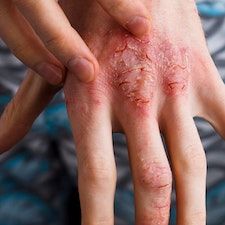Article
Positive Phase 3 Trial Results for Roflumilast Cream in Atopic Dermatitis for Adults, Children
Author(s):
Phase 3 trial data from the INTEGUMENT-1 study yielded positive results for roflumilast cream on atopic dermatitis patients ages 6 and up.

Recent phase 3 clinical trial results indicated Investigator Global Assessment (IGA) success for roflumilast cream used for atopic dermatitis (AD) in adults and children ages 6 and older, according to a press release from Arcutis Biotherapeutics, Inc.
Arcutis Biotherapeautics announced the results of its INTEGUMENT-1 study this week. The study was led by Eric Simpson, MD, MCR, FAAD, Professor of Dermatology at Oregon Health and Science University in Portland.
As the most common form of eczema, AD affects around 9.6 million children and around 16.5 million US adults. Roflumilast is a non-steroidal topical phosphodiesterase-4 (PDE4) inhibitor approved by the US Food and Drug Administration for use on plaque psoriasis in patients 12 and older. The INTEGUMENT-1 study assessed its use for AD.
“Atopic dermatitis is a chronic and burdensome disease, especially common with children, that has a significant need for rapid-acting topical treatment options outside of corticosteroids, which aren’t suitable for long-term care due to local side effects, safety concerns, and potential for rebound or withdrawal,” Simpson said.
Background
The study was a parallel group, double blind, vehicle-controlled trial involving the application of roflumilast cream 0.15% or vehicle once-per-day for 4 weeks. The cream was applied to mild-to-moderate AD patients 6 years and older, with AD affecting ≥3% of patients’ body surface area.
The research team recruited 654 AD patients in total for the phase 3 clinical trials. The primary endpoint sought out by the study involved a validated Investigator Global Assessment – Atopic Dermatitis (vIGA-AD) rating of either ‘clear’ or ‘almost clear’, in addition to a 2-grade improvement from baseline by Week 4.
Findings
The investigators reported meeting their primary endpoint, noting that 32% of patients who had been treated with roflumilast cream 0.15% receiving an Investigator Global Assessment – Atopic Dermatitis (vIGA-AD) rating of ‘clear’ or ‘almost clear’, in addition to a 2-grade improvement from baseline by Week 4, with 15.2% of those treated with vehicle reaching the same rating (P<0.01).
The researchers noted that roflumilast cream was tolerated well by study participants, pointing out that Treatment Emergent Adverse Events (TEAEs) incidence was lower and similar between vehicle and treatment.
They also noted that most TEAEs were reported as mild to moderately severe. No Serious Adverse Events (SAEs) related to treatment were reported, and both groups had infrequent rates of adverse events (no more than 2.5% of subjects for both).
“In this pivotal Phase 3 study, roflumilast cream demonstrated strong efficacy, meeting the primary endpoint of IGA success, and was well tolerated,” Simpson explained. “In addition, a significant number of adults and children were able to get to clear or almost clear in only four weeks, pointing to the potential for roflumilast cream to become an important new treatment option for atopic dermatitis.”



